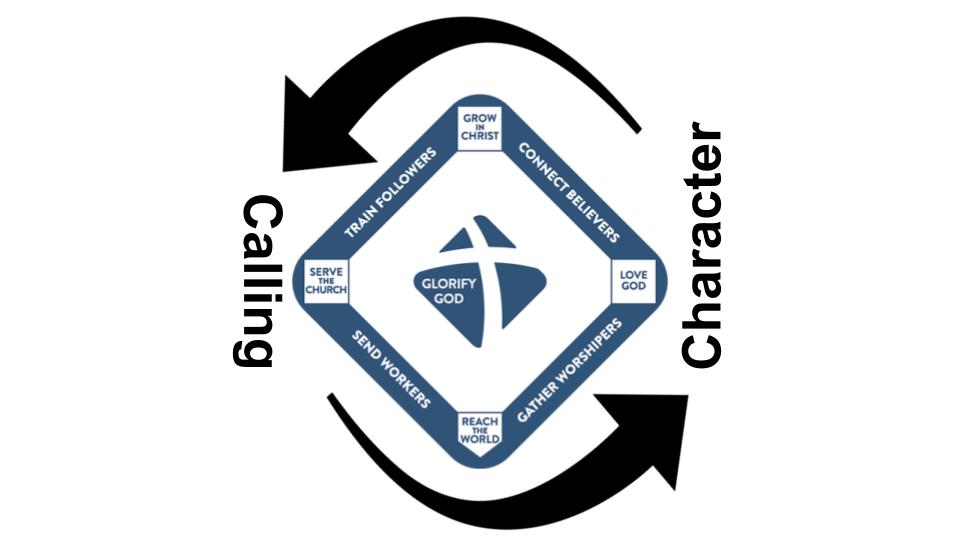
Discipleship is becoming like Jesus. Click here for a summary of our approach. Click here for our updated visuals on discipleship foundations and skills.
“While walking by the Sea of Galilee, he saw two brothers, Simon (who is called Peter) and Andrew his brother, casting a net into the sea, for they were fishermen. And he said to them, ‘Follow me, and I will make you fishers of men.’”
Matthew 4:18-19
A disciple is a follower of Jesus who is becoming like Him in His character and calling. The call of Christ transforms us in who we are and what we do.
“And Jesus came and said to them, ‘All authority in heaven and on earth has been given to me. Go therefore and make disciples of all nations, baptizing them in [lit. into] the name of the Father and of the Son and of the Holy Spirit, teaching them to observe all that I have commanded you. And behold, I am with you always, to the end of the age.’”
Matthew 28:18-20
Baptism initiates a new believer into their new identity with the physical sign of immersion in water to show that they have died to their old self and come to life as a new creation in Christ (2 Cor. 5:17). They are baptized “into the name” of our Triune God. They are immersed in the fullness of His life and bound together with Him forever.
Identity precedes action. You are a new creation in Christ, therefore you are called to live as one who is righteous and holy in Him. If we flip the order we are teaching a false religion of works-based salvation that you have to live a certain way in order to become a child of God. So the first take of the disciplemaker is to establish a new disciple in his or her new identity in Christ. “The old has gone, the new has come.”
But identity must always produce action. “You do who you are” (Jeff Vanderstelt, Saturate). If you see yourself as a worthless failure, you will live in line with that false identity. Or if you think of yourself primarily as a business person you will be a slave to your next paycheck or promotion. Or if you identify yourself by your appearance you will struggle if you ever gain a pound or add another wrinkle. But if you realize who you are in Christ and live out of that new identity, it will set you free to love and serve others and become an agent of transformation in the world.
“You are the salt of the earth, but if salt has lost its taste, how shall its saltiness be restored? It is no longer good for anything except to be thrown out and trampled under people’s feet. You are the light of the world. A city set on a hill cannot be hidden. In the same way, let your light shine before others, so that they may see your good works and give glory to your Father who is in heaven.”
Matthew 5:13-16
Remarkably, Jesus told his first disciples that they were the salt and light of the world. He was already calling them to a new identity and a new lifestyle. So the Great Commission was simply the fulfillment of that initial call to be salt and light. We baptize people into a new identity in Christ and then we “teach them to obey.”
For years the western church has taught Christians to show up and listen. We have been trained to “go to church” and “be fed” by professional Bible teachers. The “church experience” is defined by what we consume – the quality of the music, the enthusiasm of the speakers, the humor and talents of the preacher. If it’s good enough we go back and eventually chip in some cash, join a group and volunteer once in a while.
In the process of “doing church” we have lost our way with discipleship. Jesus did not say, “teach them to understand,” he commissioned us to “teach them to observe everything I have commanded you.” And the one command in the verse before that one is to “make disciples of all nations.”
So the Great Commission of our Lord Jesus is not to win coverts or to teach learners, it is to make disciples who make disciples. For most of us that is a new thing in our Christian experience. It involves a new set of beliefs, values and skills. Most of them are familiar but we have not been expected to exercise or apply them. At Oakwood, we are trying to be a part of a national movement that is reclaiming Biblical discipleship.
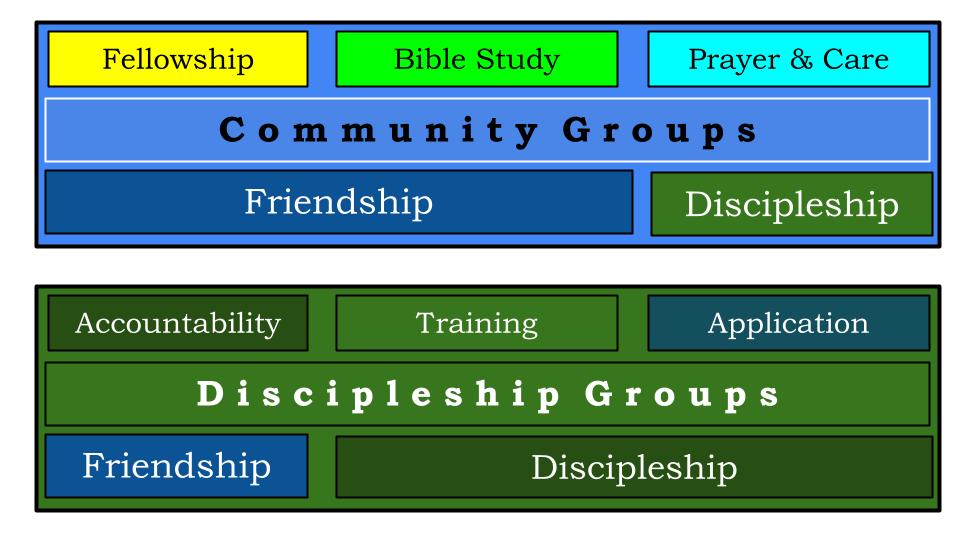
The typical community group, for example, is not designed to make disciples, it is designed to help people develop friendships and be cared for in a local church. This is a good and necessary thing! Oakwood has always prioritized small groups as an excellent tool for helping people get connected and growing in the Lord.
But we realized two years ago that community groups alone are not sufficient for us to effectively make disciples. So we introduced Discipleship Groups of 2-4 people of the same gender and initially we called them huddles. Our hope was that the smaller size would foster greater intentionality and accountability – and, to some extent, it did. But we found that our D-Groups tended to gradually shift into the community group structure that was familiar and comfortable to us.
So we have relaunched D-Groups and started providing ongoing coaching and support for D-Group Leaders.
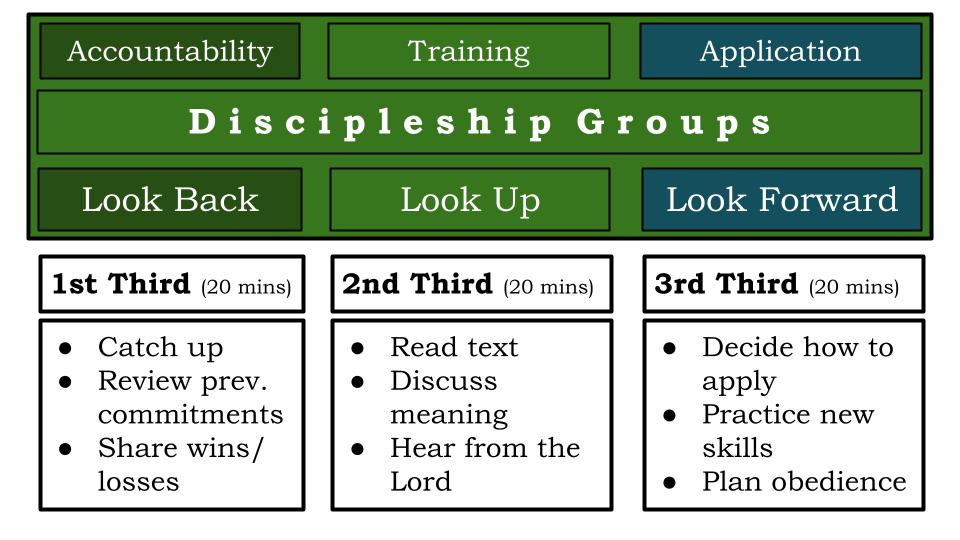
D-Groups are like Community Groups in that they are built on loving relationships, not rigid legalism. But the first part of the meeting intentionally includes “looking back” to process the past week in terms of how the members did at following through on their commitments. Each D-Group meeting should also have a “look up” component, hearing from the Lord through His Word or another resource. And the third part of the meeting is to look forward, making specific “I will” commitments to apply the “look up” portion of the day and to practice the skills needed to obey. This Three Thirds structure came from Disciplemaking movements all over the world pursuing “obedience-based discipleship” and is usually called Discovery Bible Study.
We have revamped the D-Group start-up procedure to make it very simple. In the first meeting of a D-Group, after “looking back” to get to know each other and share why you’ve joined, the group “looks up” Matthew 28:18-20, the Great Commission. Then they discuss and apply that passage using the S.O.A.P.S. method.
S. Scripture – Choose a short passage, 3-5 verses
O. Observe – What do you notice? What stands out?
A. Apply – How will you obey?
P. Pray – Ask God for wisdom and strength to obey.
S. Share – Who can you share this with?
And Jesus came and said to them, “All authority in heaven and on earth has been given to me. Go therefore and make disciples of all nations, baptizing them in the name of the Father and of the Son and of the Holy Spirit, teaching them to observe all that I have commanded you. And behold, I am with you always, to the end of the age.”
Matthew 28:18-20
Practice this now with this key passage on discipleship. SOAPS works for group study and personal Bible reading as well to encourage both prayerful obedience and prayerful discipleship (sharing what you’re learning with others).
Two critical applications from the Great Commission are:
- All believers are commanded to make disciples.
- Part of making disciples is “teaching them to observe” all of the commands of Jesus – especially the one in this immediate context – “to make disciples.”
So all disciples are commanded to make disciples who make disciples. This is the normal Christian life, not a special assignment for pastors and missionaries. If we are going to create a culture of multiplying disciplemakers we have to develop a simple process that is easy to reproduce. That is what we are attempting with this updated approach to D-Groups.
A helpful skill to practice and start to share is your 30 second testimony. Introducing this and practicing it should be part of the final third of your first D-Group meeting.
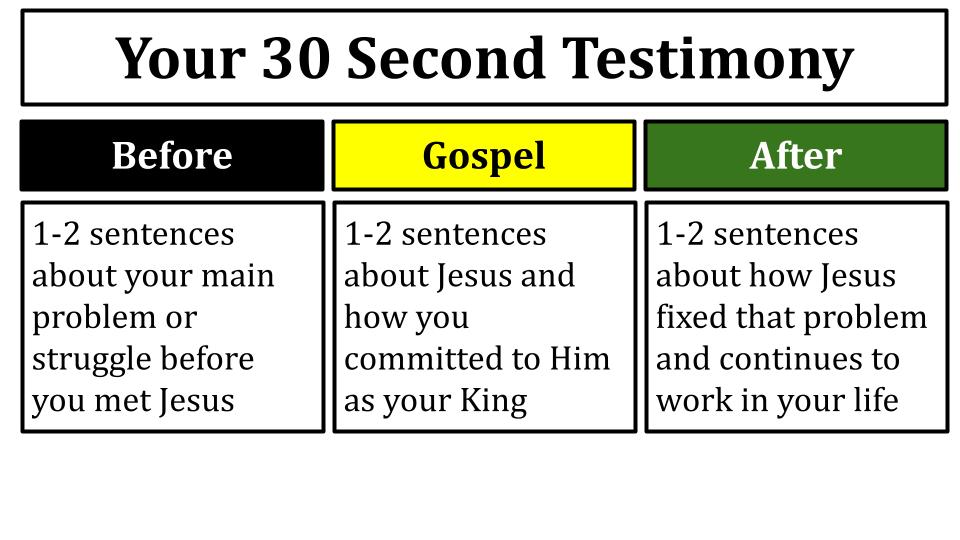
Literally set a timer and share your story, making sure that JESUS is the hero. Articulate one significant problem you had. Clearly express the gospel. Then show how Jesus changed your life and continues to work in and through you now. Practice this 3-4 times together. Then over the next week, continue to clarify and improve your testimony by writing it out and sharing it with one believer and one non-believer. A brief but clear personal testimony is tremendously powerful to showcase the power of the gospel to change lives! And since it’s your experience, no one can argue with it!
In your subsequent D-Group meetings you will follow the same Three Thirds process, using these key Bible passages for the “look up” portion.
- Session 2 – Matthew 22:34-40 (the Great Commandment – LOVE GOD)
- Session 3 – Colossians 2:1-7 (GROW IN CHRIST)
- Session 4 – John 13:12-20 (the foot washing – SERVE THE CHURCH)
- Session 5 – Acts 1:4-8 (REACH THE WORLD)
By the end of these five orientation sessions you should have established the discipleship patterns of 1) a Three Thirds meeting that includes loving accountability (looking back) and proactive practice of essential skills (looking forward); 2) the expectation of obedience every time you read the Bible; 3) the expectation of sharing what you’re learning with others every time you read the Bible and; 4) clear and specific personal commitments for each of our four bases in the baseball diamond (love, grow, serve, reach).
Many of us who have been in D-Groups for a year or two might say, “that’s not how we’ve been doing it.” Right. Hence this reboot and the new monthly training. We all naturally default to doing things the way we always have. Most of us have been thoroughly trained in leading Community Groups that don’t tend to practice looking back accountability or looking forward commitments. We tend to cruise along in the comfortable patterns that have become normal in most Christian circles. Over the last 50 years the American church has become very consumeristic (what can the church do for me?), dependent on professionals (how did the pastor inspire me this week?) and information focused (what interesting thing did I learn?).
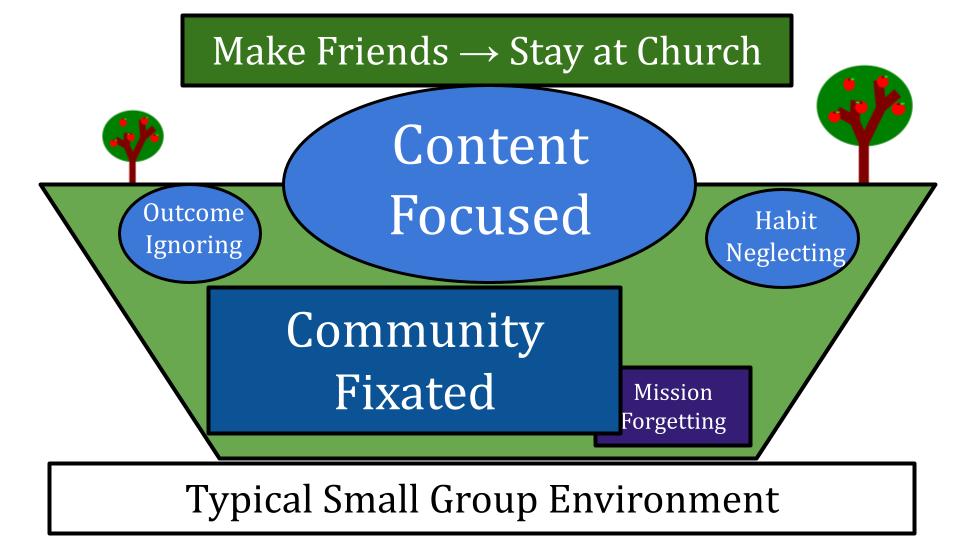
Most Community Groups are strong in two areas: relationships and information. But they tend to be weaker when it comes to clear outcomes, encouraging specific habits and pursuing outreach or service consistently. Our goal as a leadership team is to build on Oakwood’s wonderful strengths of Bible knowledge and loving relationships to develop a deep rooted culture of obedience based discipleship.
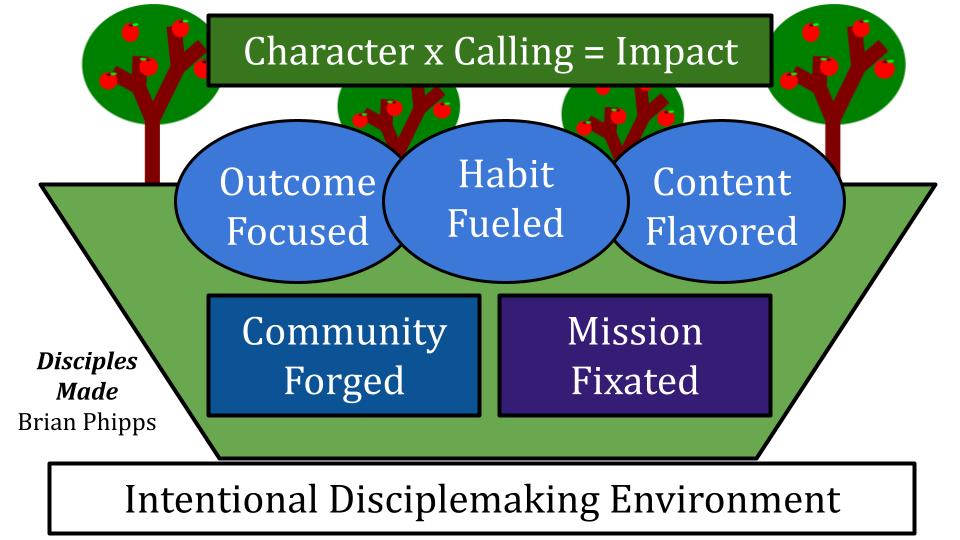
D-Groups are our official platform for intentional disciplemaking, but our hope is that all of our groups and ministries will increasingly embrace this thinking and these practices. An I.D.E. is:
- Outcome focused – committed to helping people grow in specific areas. We have embraced the outcome language of character and calling as a summary of becoming like Jesus. Choose one “fruit of the Spirit” (character) to grow in this fall. Choose one “gift of the Spirit” (calling) to exercise more fully right now. Those are outcomes – specific target areas you sense the Lord leading you to become more like Jesus in. Think like a personal trainer helping someone with specific health or fitness goals. Don’t send that person to the library – start working with them in the gym. For more on this aspect of an I.D.E. listen to the first episode in the Disciples Made Podcast.
- Habit fueled – To grow in any area means committing to specific habits or disciplines. H20 means “habits to outcomes.” Once you’ve identified specific character and calling outcomes to work on, prayerfully identify the habits that will most help you grow in those areas. This will change how you read the Bible and pray. SOAPS will help too, as will Three Thirds. Those are new habits. We need to help people stop reading the Bible just to learn more information (“knowledge puffs up”) and “teach them to observe all that Jesus has commanded us” (“love builds up”).
- Content flavored – The gospel is central to discipleship. We need to help people grow in “gospel fluency,” seeing that the good news of Jesus’ finished work is not just what saves us and gets us into heaven, it is what changes us and fills us and empowers us to do the work of ministry. “The gospel is not the diving board into the pool, it is the pool” (J.D. Greear). The Bible is essential to make disciples – but we have to be careful not to let information and knowledge take over. We need to “dethrone content as king.”
- Community forged – The container for the first three components is the last two – community and mission. Discipleship is a group activity, not a solo sport. You will not grow very well on your own, nor will you have much kingdom impact apart from a team of believers around you.
- Mission fixated – The first word of the great commission is “go.” We have work to do to reach our neighbors and the nations. Discipleship that does not prayerfully pursue lost people with the love and grace of Jesus is not discipleship. As believers become disciples and as disciples become disciplemakers we will increasingly find ourselves out in the harvest field rather than always hanging out in our “holy huddles.” This is what the calling series is intended to stir up – where has the Lord placed you? Where is He calling you to reach out? Who has a similar passion? How can you love and serve and reach out to people together?
This is a long journey and we have a lot of work to do to embed these ideas and habits into the DNA at Oakwood. This is a massive paradigm shift that many leaders in the American church are calling for and a few churches are bravely leaning into.
For now just think about the Bible that you read today. Stop for a minute and pray right now about how you truly plan to obey one passage in that reading and ask the Lord to show you one person you could share with.
Click here for the larger vision of Discipleship at Oakwood and in Tampa Bay!
